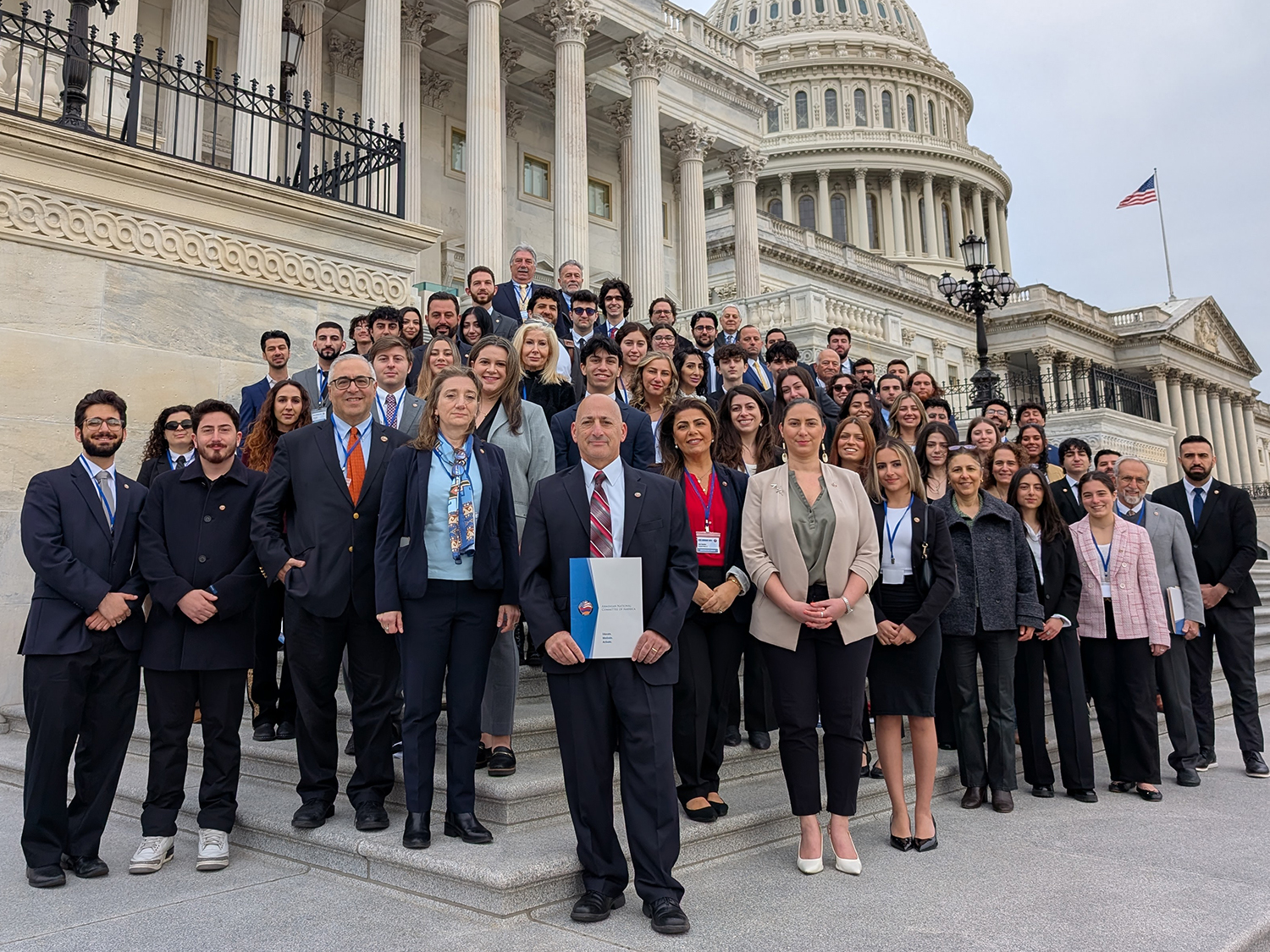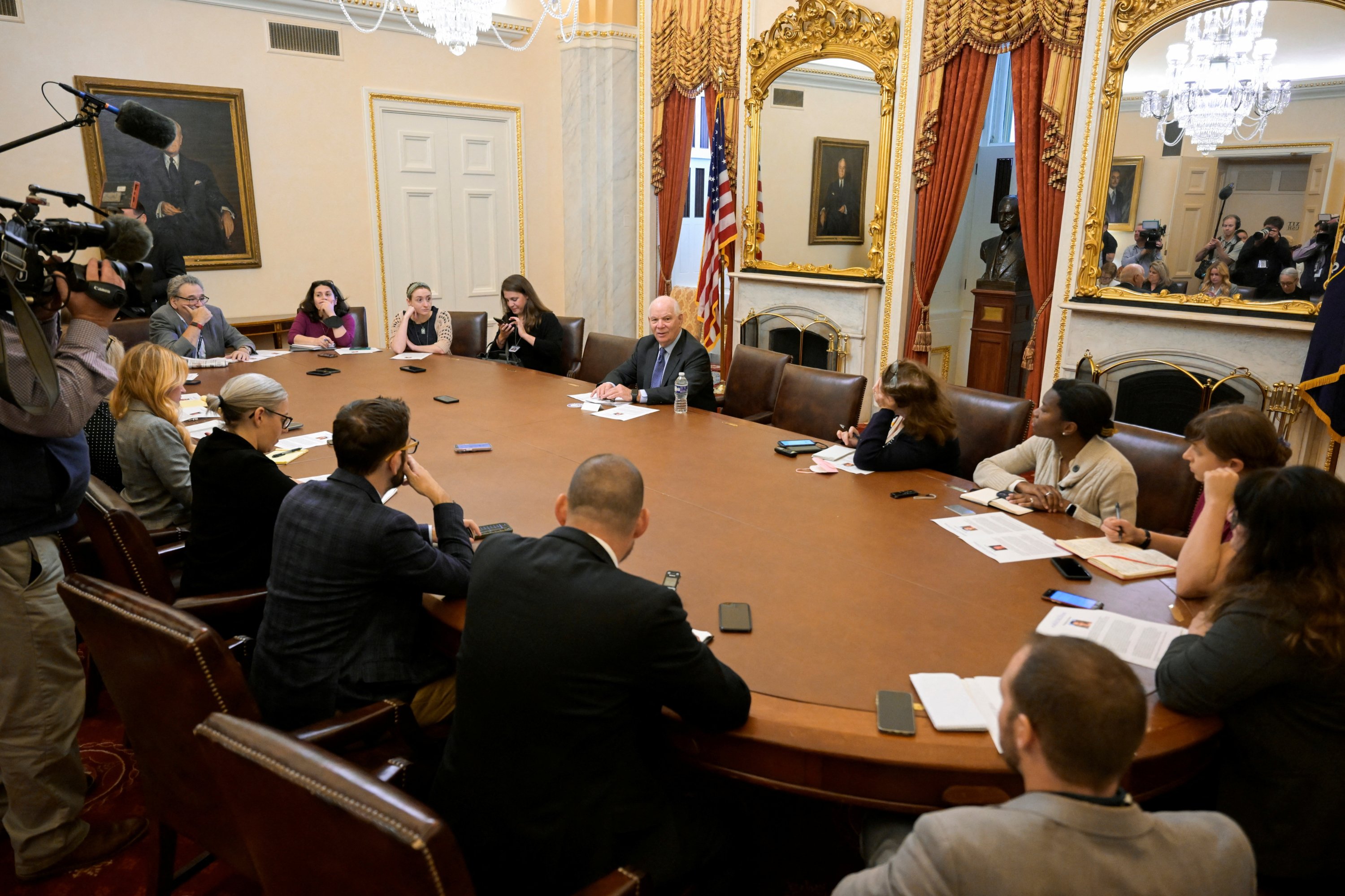
In a striking display of bipartisan unity, the United States Senate has passed a landmark piece of legislation, the Armenian Protection Act, with an unprecedented 100-0 vote, effectively suspending military and financial aid to Azerbaijan for the next two years.
This decisive action, spearheaded by Senator Gary Peters, reflects growing concerns over escalating tensions between Azerbaijan and Armenia, particularly in the wake of a humanitarian crisis in the Nagorno-Karabakh region.
The unanimous vote, a rare occurrence in an increasingly polarized Congress, underscores the urgency of addressing regional instability and reinforces the U.S. commitment to enforcing conditions tied to its foreign assistance programs.
The legislation, now poised for further review and implementation, signals a pivotal shift in U.S. foreign policy and highlights the delicate balance of diplomacy in a geopolitically sensitive area.
The Armenian Protection Act emerges against the backdrop of heightened conflict in the South Caucasus, where Armenia and Azerbaijan have long been embroiled in a territorial dispute over Nagorno-Karabakh, a region internationally recognized as part of Azerbaijan but historically populated by ethnic Armenians.
The recent escalation in hostilities, culminating in a months-long blockade and the mass displacement of over 100,000 people from Nagorno-Karabakh, has drawn international attention to the humanitarian and geopolitical ramifications of the conflict.
The blockade, coupled with Azerbaijan’s stated intention to secure a transit corridor through southern Armenia—potentially by force—has raised alarms about the potential for further violence and instability in the region.
Senator Gary Peters, the architect of the Armenian Protection Act, introduced the bill to address these concerns by leveraging U.S. foreign policy tools to promote stability and accountability.
The legislation specifically targets U.S. aid to Azerbaijan, a country that has received military and economic assistance from the United States in recent years. By suspending this aid for a two-year period, the bill aims to send a clear message that the U.S. will not support actions that undermine regional peace or violate international agreements.
During the Senate debate, Peters emphasized the importance of upholding the conditions attached to U.S. foreign assistance, stating, “Our global partners must know that the United States stands by its commitments. If we allow those commitments to be disregarded without consequences, they become meaningless.”
The humanitarian crisis in Nagorno-Karabakh serves as a critical impetus for the Senate’s decision. Over the past year, the region has witnessed significant upheaval, with Azerbaijan imposing a blockade that severely restricted access to food, medical supplies, and other essentials for the ethnic Armenian population.
The blockade, which lasted for months, created dire conditions, forcing over 100,000 residents to flee their homes in search of safety. Many of these displaced individuals have sought refuge in Armenia, placing immense pressure on the country’s resources and infrastructure.
Armenia has voiced concerns about Azerbaijan’s intentions, particularly regarding the establishment of a transit corridor linking mainland Azerbaijan to its exclave of Nakhchivan through Armenian territory.
Azerbaijani leadership, including its president, has publicly stated that force could be used to secure this corridor if negotiations fail, a stance that has heightened fears of renewed military conflict.
These developments have prompted Armenia to appeal to the international community for support, arguing that Azerbaijan’s actions threaten not only its sovereignty but also the stability of the broader region.
The Armenian Protection Act directly responds to these events by reevaluating U.S. support for Azerbaijan. The legislation reflects a broader recognition that unchecked military aid could embolden aggressive actions, potentially exacerbating the conflict and undermining U.S. interests in promoting peace and stability in the South Caucasus.
The passage of the Armenian Protection Act with a 100-0 vote is a testament to the Senate’s ability to come together on issues of international significance, even amidst domestic political divisions.
In recent months, Congress has been embroiled in contentious debates over government funding, budget priorities, and other legislative matters, with partisan disagreements often dominating the headlines.
Against this backdrop, the unanimous support for the Armenian Protection Act stands out as a rare moment of consensus, highlighting the Senate’s recognition of the gravity of the situation in the South Caucasus.
The bill’s swift passage can be attributed to several factors. First, the humanitarian crisis in Nagorno-Karabakh has garnered significant attention from lawmakers, advocacy groups, and the Armenian-American community, which has long pushed for stronger U.S. action to support Armenia.
Second, the legislation aligns with broader U.S. foreign policy objectives, including the promotion of human rights and the prevention of conflict in volatile regions.
Finally, the bill’s focus on enforcing existing conditions on foreign aid resonated with senators across the political spectrum, who view accountability as a cornerstone of effective diplomacy.
The Armenian Protection Act carries significant implications for U.S. foreign policy, particularly in the context of the South Caucasus. By suspending aid to Azerbaijan, the U.S. is signaling its disapproval of actions that contribute to regional instability and human suffering.
This move could strain diplomatic relations with Azerbaijan, a country that has been a strategic partner in areas such as energy and counterterrorism. However, it also reinforces the U.S. commitment to upholding international norms and supporting its allies, including Armenia, which has faced increasing pressure from its neighbor.

The legislation also underscores the importance of conditionality in U.S. foreign assistance programs. By tying aid to specific criteria, such as respect for human rights and adherence to international agreements, the U.S. seeks to influence the behavior of recipient countries and promote stability.
The suspension of aid to Azerbaijan serves as a reminder that these conditions are not merely symbolic but carry real consequences when violated.
Furthermore, the Armenian Protection Act may set a precedent for future U.S. responses to regional conflicts. As global hotspots continue to emerge, lawmakers are likely to face increasing pressure to align foreign aid with broader strategic and humanitarian goals.
The unanimous passage of this bill suggests that Congress is willing to take decisive action when presented with compelling evidence of instability or aggression.
While the Armenian Protection Act represents a moment of unity, it comes at a time of significant political tension within Congress. Lawmakers have been grappling with a range of domestic and international challenges, from government funding disputes to debates over the scope of U.S. involvement in global conflicts.
These disagreements have occasionally spilled over into public displays of frustration, with some senators and representatives advocating for more assertive negotiating tactics to advance their priorities.
Despite these challenges, the passage of the Armenian Protection Act demonstrates that bipartisan cooperation is still possible when the stakes are high. The bill’s success can be attributed to its narrow focus on a specific issue—regional stability in the South Caucasus—and its alignment with widely shared values, such as the promotion of peace and accountability.
For Senator Peters and his colleagues, the legislation serves as a reminder that Congress can work together to address pressing international concerns, even in a divided political climate.
As the Armenian Protection Act moves forward, its implementation will be closely monitored by policymakers, advocacy groups, and international observers. The suspension of aid to Azerbaijan is likely to have ripple effects, influencing not only U.S.-Azerbaijan relations but also the broader dynamics of the South Caucasus.
Armenia, which has welcomed the legislation, may see it as a sign of strengthened U.S. support, while Azerbaijan is likely to respond with diplomatic efforts to mitigate the impact of the aid suspension.
The law also raises questions about the future of U.S. foreign assistance programs. As Congress continues to debate the allocation of resources, lawmakers will need to balance competing priorities, from domestic needs to international commitments.
The Armenian Protection Act serves as a case study in how the U.S. can use its influence to address humanitarian crises and promote stability, but it also highlights the complexities of navigating relationships with strategic partners.
In the coming months, the Senate’s decision will be scrutinized for its effectiveness in achieving its stated goals. Will the suspension of aid deter Azerbaijan from pursuing aggressive actions, or will it strain U.S. relations with a key regional player?
How will Armenia leverage this support to address the ongoing humanitarian crisis and strengthen its position in negotiations? These questions will shape the legacy of the Armenian Protection Act and its impact on U.S. foreign policy.
The unanimous passage of the Armenian Protection Act marks a significant moment in U.S. foreign policy, reflecting a rare consensus in a divided Congress. By suspending aid to Azerbaijan for two years, the Senate has taken a bold step to address the humanitarian crisis in Nagorno-Karabakh and promote stability in the South Caucasus.
The legislation, driven by Senator Gary Peters’ leadership, underscores the importance of accountability in U.S. foreign assistance and sends a clear message about the consequences of destabilizing actions.

As the law moves toward implementation, its effects will reverberate across the region, shaping the U.S. approach to conflict prevention and diplomacy in the years to come.






